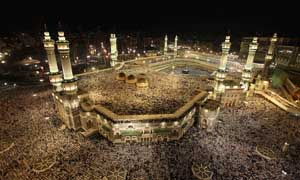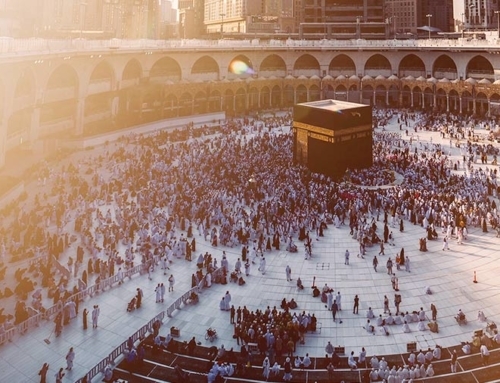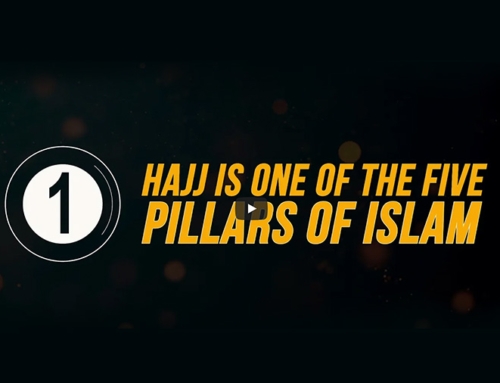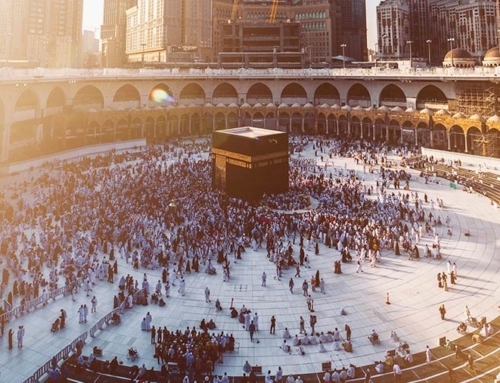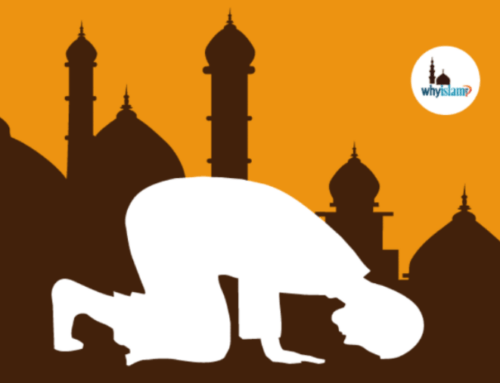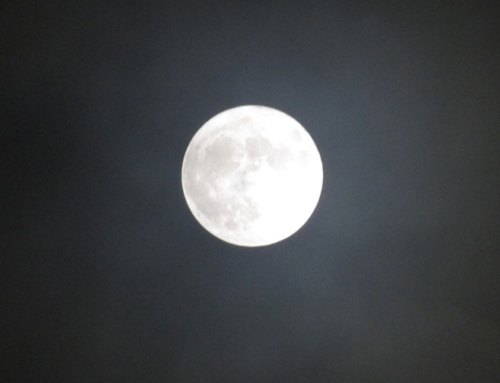By: Syed Abul Ala Maududi
The Origin and Significance of Hajj
Hajj, or the Pilgrimage, is the last among those acts of Worship, which Islam enjoins upon you. Like the prayer, Fasting and Almsgiving, it mounds your life and prepares you so that you may live in surrender to Allah.
The word Hajj means to make a resolve to visit a holy place: Visiting the Ka’aba in Makka is therefore called Hajj.
How did it begin? The Origin of Hajj is rooted in the Prophet Ibrahim’s life, peace be on him. That story is instructive, and illustrative, too, of the true meaning and significance of Hajj. That story you must know to fully understand the benefits Hajj can bring to you.
Life and Mission of the Prophet Ibrahim
Which Muslim, Christian or Jew does not know the name of Ibrahim (peace be on him)! Two-Thirds of mankind revere him as their leader. The Prophets Musa, Isa and Muhammad peace be on them, are all his descendants. It is the lamp of guidance lit by him that has for long illuminated the whole world.
Ibrahim’s Times
Ibrahim was born in what is now Iraq, over four thousand years ago. At that time the people had forgotten the One God. No one recognized him as the Master, no one lived in surrender and obedience to Him. The people among whom Ibrahim was born, while the most advanced in the world in art and science, industry and agriculture, were also the most steeped in ignorance and error. One simple they despite their technological advance, could not understand: anything, which has itself been created cannot be worthy of worship. Idolatry was the norm. Superstitions like astrology, idol-worship, divination, Witchcraft and use of talisman and amulets were widespread.
Power and Beliefs of the Priest Class
A priest class controlled the class controlled the temples, supervised worship rites and rituals, conducted marriage and funeral ceremonies, and claimed to be oracles able to disclose the unknown, foretell the future, and determine Divine wishes. And the people, in general, believed that they indeed had such powers, that they access to their deities, that they could intercede with them on their behalf or invoke their wrath to fall upon them. For them the priests were the lords of their fate.
Ibrahim: Breaking Free from Priestly Power
The kings were in collusion with the priests, the two sides working together to keep the people under servitude. They gave full backing to the priests, and the priests made people believe that the king of the day, as well as being the owner of his country and complete master of his subjects, was also a god among other gods. His word was absolute. Indeed, worship rites were performed for and before the king so that the belief in his godhood came to be entrenched in the minds of his subjects.
In times like this, the Prophet Ibrahim was born into a family of privileged priests. His forefathers were high priests and it was quite natural that he should follow in their footsteps. He received the same education and training; the same gifts and offerings were awaiting him. Many adherents were eagerly waiting for the moment when they could bow their heads before him with folded hands. The ancestral seat of priestly power could be his for the taking.
In his dismal darkness, where not a single soul existed who knew or believed in the Truth, it would not ordinary have been possible for a man like Ibrahim to find its light, nor break away from the little of comfort and power mapped out for him by his family.
Commitment to the Truth
But the prophet Ibrahim was no ordinary man; he was made of different stuff. On reaching maturing he began to reflect thus: How the sun, moon or stars, which are rotating as if by order like slaves, and these stone idols, which are made by man himself; and these kings, who are beings like ourselves, be gods. What is there in these powerless objects, which cannot move of their own volition, which have no power to help themselves and have no control over their own lives and deaths, that man should worship them, seek fulfillment of his wants from them, fear their powers and submit in obedience to them? Among all the objects on earth and in the heavens, there is not a single one which itself is not subject to some higher power and which does not fade away into oblivion at some time or other.
Ibrahim’s Stand Against Idol Worship
When none of them is my creator, when neither my life nor death is in the hands of any of them, when none of them possesses the key to my of substance or the fulfillment of my needs, why should I accept them as lords, surrender to them, and obey them? Only that Being can be my Lord who created all things, on whom depends everything and in whose hands are the lives and deaths of all people.
These thoughts led the Prophet Ibrahim to the decision that he would never worship the deities, which his people worshiped, and he openly declared before them.
Let Us Be Muslims
O my people, I am quit of all those you take as gods beside God. I have turned my face unto Him who brought into being the heavens and the earth, having turned away from all false gods; and I am not of those who take gods beside God (al-An’am 6: 79-80)
Tribulations and Calamities
No sooner had he made this declaration than tribulations and calamities of the greatest magnitude descended on him. His father threatened him with expulsion from the family home. His community warned him that no one among them would give him refuge. And the government officials insisted on his case being brought before the King. But Ibrahim, lonely and forsaken by his relatives and friends, stood firm as a rock in the case of the Truth. He told his father respectfully: The knowledge I have has not been vouchsafed to you. As such, instead of my following you, you should follow me [ Maryam 19: 41-5]. In answer to the threats of his community he broke their idols with his own hands to prove how powerless they were [al-Anbiya’ 21: 57-70]. In the court of the King, he boldly declared: You are not my Lord, My Lord is He in whose hands are your life and death as well as mine, and within the bounds of whose law even the movements of the sun are circumscribed [al-Baqarah 2: 258].
A Journey of Sacrifice and Conviction
The royal court decided that Ibrahim should be burnt alive and he willingly came forward to suffer this horrible punishment for the sake of his unshakeable faith in the One God. After Allah with his supreme power saved him from this fate, he abandoned his home, his relations, his community and his country. He set out with his wife, Sarah, and a nephew, Lut, to wander from one land to another.
To this man the undisputed religious leadership of his people had been available. Yet he gave up wealth and power preferred the homeless and destitute wanderer rather than have to mislead people into the continuing worship of false gods. He chose to live for the purpose of summoning people to their true God, even though he would be driven to place to place.
Migration
After leaving his home, the Prophet Ibrahim wandered in Egypt, Palestine and Arabia. God, alone, knows what sufferings he went through on his journeys. He had no money or possessions nor did he have time to earn his livelihood. His sole vocation, day and night, was to bring people to the worship of the One God. If a man of such ideas could not be tolerated by his own father and his own community, how was he going to be any more successful elsewhere? Where would he be welcomed? Everywhere the same temple priests and kings claiming godhood held sway; everywhere the same confused and ignorant common men lived, who were completely hoodwinked by them. How could, then, Ibrahim live peacefully in such an environment? For, not only was he himself not ready to accept the godhood of anybody except God, but he was also committed to proclaiming to the people that none except Allah was their Master and Lord and that, therefore, they should ignore the authority of their leaders and demi-gods and submit only to the One Being. Thus condemned to a nomadic existence, wandering through Palestine, Egypt and the vast deserts of Arabia, he passed his whole adult life.
Raising a New Generation
During the last period of his life, when he was eighty-six and had despaired of offspring, Allah gave him a child, Ismail. But even then, this loyal servant of Allah did not think that, having himself wrecked his own home life, he should at least prepare his children to earn their living. No. His only concern was that the mission on which, he had spent his whole life should be carried on after his death. It was for this purpose that he had prayed to Allah to grant him children [l-Baqarah 2: 128]. And when Allah granted his request, his only thought was to educate and train them to continue his mission. The life of this perfect man was the life of a true and genuine Muslim. In early adulthood, when he had found God, God asked him: ‘aslim’, that is, enter Islam, surrender yourself totally to Me, be solely Mine. In reply, he gave the pledge: ‘aslamtu li-rabbi ’l-alamin’, that is, I have entered Islam, I belong to the Lord of the worlds, I have entrusted myself wholly to Him, I am ever ready to obey (al-Baqarah 2: 13). To this pledge Ibrahim remained true throughout this life. He gave up, for the sake of the Lord of the worlds, his ancestral religion together with its beliefs and rituals and renounced all the material benefits he could have derived from it. He braved the danger of fire, suffered homelessness, wandered from country to country, but spent every moment of his life in obedience to the Lord and in propagating His Din.
The Greatest of Trials
But even after all these tribulations, there was still one trail left to determine whether Ibrahim’s love for his Lord was supreme above all else. Before the birth of his second son, he was asked tom sacrifice what was then his only child to God. [al-Saffat 37: 99-111]. When Allah had shown that Ibrahim was prepared to slaughter his son for His sake with his own hands, He said: ‘You have fully vindicated your claim to be a totally true Muslim. Now you deserve to be made the leader of the whole world.’ This act of investiture has been described in the Qur’an thus.
And when his Lord tested Ibrahim With [His] commands, and he fulfilled them all, He said, Behold, I make you a leader of mankind. Said he [Ibrahim]: And my offspring [will they too be leaders]? He said: My covenant shall not reach the evil-doers (al-Baqarah 2: 124).
The Universal Islamic Movement
In this manner Ibrahim became a pioneer of the universal Islamic movement and set about establishing permanent missions in different regions. In this task he was aided by his nephew, Lut, his eldest son, Ismail who, on learning that the Lord of the worlds wanted the sacrifice of his life, had himself willingly placed his neck under the knife, and his younger son, Ishaq.
Lut In Sodom
Ibrahim settled his nephew, Lut in Sodom, which was infamous for its moral depravity. Ibrahim’s objective was to reform the people and also to influence the far-flung area around; traders traveling between Iran, Iraq, and Egypt used to pass through the region, and it was therefore an ideal place from which to spread God’s message.
Ishaq in Palestine
The younger son, Ishaq, was settled in Palestine. This region, situated between Syria and Egypt, and being on the coast, was also a good center for spreading Ibrahim’s message. From this region the Islamic movement reached Egypt through Ishaq’s son, Ya’qub (whose name was also Israel), and through his grandson, Yusuf, peace be on all of them. The elder son, Ismail, was assigned his headquarters at Makka in the Hijaz and Ibrahim himself stayed with him for a long time to propagate the teaching of Islam throughout Arabia.
Construction of the Ka’aba
It was in Makka that Ibrahim and his son built the Holy Ka’aba, the center of the Islamic movement, on a site chosen by Allah Himself. This building was not intended for worship only, as mosques are; its purpose was to act as the center for spreading the universal movement of Islam, a world-wide gathering point for believers in the One God to assemble to worship Allah in congregation and go back to their respective countries carrying with them the message of Islam. This was the assembly, which was named Hajj. Exactly how this center was constructed, with what hopes and prayers both father and son raised its walls, and how Hajj was initiated are described thus in the Quran:
The first house ever set up for mankind was indeed that at Bakkah, a blessed place, and guidance unto all beings; wherein are clear signs – the place whereon Ibrahim stood; and whosoever enters it finds peace (3: 96-7).
Have they not seen that We have made the sanctuary immune [from violence], while men are being carried away by force all around them (29: 67).
Peace always reigned in and around the Ka’aba, when all around it were rampant plunder, murder, devastation, conflict, and warfare – such was its sanctity that even the Bedouins who respected no law, if they detected in its precincts the murderer of even their father, did not dare to touch him.
Prayers of Ibrahim
Look at Ibrahim’s prayers to find out what the real purpose and significance of Hajj is:
And when We made the House a place of visitation for mankind, and a sanctuary; take, then, the place whereon Ibrahim stood for place of prayer. And We commanded Ibrahim and Ismail, ‘Purify My House for those who will walk around it, and those who will abide therein in worship, and those who will bow down and prostate themselves.’ And when Ibrahim prayed: My Lord! Make this a land secure and provide its people fruits, such of them as believe in God and the Last Day.
Prayers of Ibrahim: Seeking Guidance, Purification, and Divine Mercy
And when Ibrahim was raising the foundations of the House, and Ismail, [they prayed]: Our Lord! Accept Thou this from us. Thou, Thou alone, art the All-hearing, the All-knowing. Our Lord! And make us surrender ourselves unto Thee, and out of our offspring make people surrender themselves unto Thee; and show us our rites of worship, and turn toward us; surely Thou alone turnest, and art the Mercy-giving. Our Lord! Do Thou send to them a Messenger, from among them, who shall convey unto them Thy revelations, and teach them the Book and the Wisdom, and purify and develop them. Thou alone art the All-mighty, the All-wise! (Quran 2: 125-9).
And when Ibrahim prayed, My Lord! Make this land secure, and keep me and my sons away from worshipping idols. My Lord! They have led astray many people. Hence whoso follows me truly belongs to me; and whoso disobeys me – surely Thou art All-forgiving, Mercy-giving. Our Lord! I have settled some of my offspring in a valley where are no arable lands, near They sanctified House, our Lord, so that they may perform the Prayer, and Thou make peoples’ hearts to incline towards them, and provide them fruits so that they may be thankful (Quran 14: 35-7).
The Assignment of Ibrahim: Purifying the House and Proclaiming the Pilgrimage
And when We assigned unto Ibrahim the place of the House [We said]: You shall not take any god beside Me, and purify My House for those who will walk around it and those who will stand, and those who will bow down and prostate themselves. And proclaim unto mankind the Pilgrimage; and they will come unto you on foot and on every lean mount, they will come from every deep ravine, so that they may witness things that are of benefit to them, and mention God’s name during the days appointed over such heads of cattle He has provided them. Eat, then, thereof, and fee therewith the unfortunate poor (Quran 22: 26-8).
Hajj: Makka and the Ka’aba
This is the story of the beginning of that Hajj which is the fifth pillar of Islam. You now understand that Makka was the headquarters for the mission of the first Prophet appointed to propagate the message of Islam. The Ka’aba was the focal point from where this preaching was spread across the world, and the worship rites of Hajj were introduced so that all those who chose to live in surrender to God alone should belong to one center where they could assemble every year, and go around it again and again. Their lives of faith were to be like the wheel tied to and revolving around its axle.
Excerpts taken from book “Let us be Muslims” by Syed Abul Ala Maududi
Got Questions?
We have Answers. Get in touch now.


